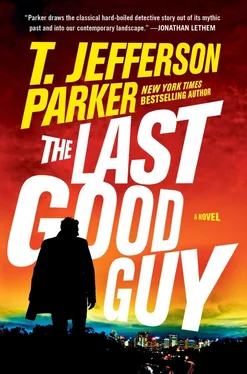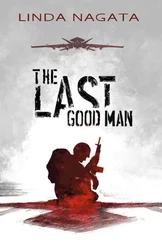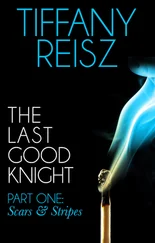They let the older sister out of the cruiser, and after a “ten-minute discussion,” the police let her come back inside the store. Yash answered her questions politely and hoped she wouldn’t start screaming at him, too. But she had calmed down by then, and Yash saw that she was not drunk or deranged at all but was very worried. She wrote her name and number on a complimentary snack napkin and ordered him, politely, to call if he saw her sister again.
I thanked Yash and handed him a business card. Told him the same thing Penelope had told him. “Or if you remember something that might help me locate her,” I added. “But call the police first.”
“Yes, of course.”
The three of us shook hands.
“You forgot something,” said Burt, looking up at Yash with his odd smile. Some of Burt’s bottom teeth show a little when he smiles, and if he’s looking up at you — which is often, because he’s short — the smile looks half jolly and half diabolical. I might know Burt well enough to say it’s mostly jolly, but I really might not. He has a strangely persuasive effect on some people.
“What did I forget?” asked Yash.
“Everyone forgets something,” said Burt.
Yash frowned down at Burt, brow furrowed, as if trying to take the man and his question seriously.
“She asked if we sell burner phones,” said Yash. “The younger sister. I just remembered that.”
“And?” asked Burt
“No, we don’t,” said Yash. “I told her to try Walmart.”
“Glad I asked.”
“And I always remember everything,” said Yash, looking puzzled. “There’s nothing else to do with a job as boring as mine.”
Burt and I walked south down the beach at San Onofre, past the prime surf breaks — the Point and Old Man’s and Dog Patch. I’m almost a foot taller than Burt — I was six-three and two hundred ten pounds as the heavyweight Rolling Thunder Ford — and I take long steps. But I was moving slowly that day and Burt had no trouble keeping up with me over the rock-studded beach.
I told him I’d struck out with Pastor Reggie Atlas, but that he appeared to be worried for himself and his family. Burt took that in short stride.
“Any clear reason why?” he asked.
“Nick Moreno. A missing girl who had possibly visited his church not long ago. My face.”
“Preachers know more secrets than shrinks.”
“One long confession,” I said.
“He’s hiding something.”
Which is what I had figured, too. “Aren’t we all?”
“True,” said Burt. “But trite.”
The San Onofre Nuclear Generating Station shimmered in the sun up ahead of us, its two nippled domes rising like enormous concrete breasts from the sand. Thick black power lines laced the sky above the structure, lines that once carried rivers of electricity up over the Camp Pendleton hills and deep into Orange County.
No more. No more plumes of steam rising into the air. The station had been closed for six years now, following the failure of suspect Mitsubishi steam generators. The plant operator, Southern California Edison, claimed that the generators were defective and had failed years ahead of schedule. Mitsubishi disagreed and refused to replace or repair them. Which left rate payers on the hook for the plant closure and decommissioning, buying more expensive electricity elsewhere, and, most important, the four-billion-dollar cost of storing the waste.
No one in their right mind wanted it here. Not in our state. Not with Nevada and New Mexico offering to take it off our hands for a fee. Much the same story as other nuclear power plants across our land.
Now, as Burt and I approached, a mere eighteen hundred tons of deadly radioactive waste waited in limbo in temporary cooling pools and storage canisters buried somewhere down near the shoreline. All subject to time, design flaws, maintenance oversights, monitoring failures, leaks, earthquakes, tsunamis, and terrorist explosives.
But on a beautiful September afternoon like this, no one was thinking about such lethal surprises. Clear skies, mid-seventies, four- to six-foot waves and a mild offshore breeze to hold them upright. Pale green cylinders, thin-lipped and top-dusted. Crowded, as California breaks almost always are. I surfed until I went to war and never since. I don’t know why.
We came to Old Man’s, long the home of the San Onofre Surfing Club. Mom and Dad were active members back in the sixties and I joined myself as a college kid at SDSU. Ground zero of the club is the shack, which is just that, a rudimentary, unwalled frame of lumber for propping up longboards, holding up tarps for shade, providing a hint of cover for the occasional beer. Nearby, trees and tables and outdoor showers.
Surfers, mostly young, were hanging around the shack, some sprawled in the sand for warmth. Beyond the skeletal structure, the waves rolled in in near perfect symmetry. I talked to some of the boys, but only a few had been here on Wednesday afternoon, and none had seen a girl who looked like the picture on my phone.
Finally, one of them, barely a high schooler by the look of him, had been here late last Tuesday afternoon — the day after Daley Rideout had left Monarch. Yes, he said, he’d noticed a girl and two men who weren’t club members or locals. He peeled off his wetsuit, teeth chattering and hair dripping, looking at my phone screen as I swiped through the pictures of Daley Rideout for him. He nodded.
“Her name’s Daley,” he said. “You a cop?”
“No. A friend. I was a member here once.”
“Man, what happened to your face?”
“I cut myself shaving.”
A look.
I introduced myself. He gave me a quick once-over, palmed his hair off his forehead with both hands, must have decided I was okay.
He described the men as “way older than her,” and said he couldn’t quite figure out their relationship. It was like the men were in charge of her but she wouldn’t do what they said. None of them were dressed for the beach. Daley had on jeans and a sweatshirt that looked too hot for summer, and the guys looked like they’d come from work — long pants and collared shirts and, like, corporate shoes, you know?
“She was cool,” he said. “She wanted a beer, but there was only water in the cooler. She wanted to know about my board, and if my wetsuit worked, then why did I have goose bumps and blue lips, and didn’t it hurt to walk over the rocks to get in and out? The two guys, like, stood off, over there, looking at the waves and waiting. She asked if she could borrow my towel, but I didn’t have one, so I got one from Sean and she took off her sweatshirt and laid down in the sun for a while.”
“And her friends?” I asked.
“Just hung down closer to the water. Watching her and checking their phones. After half an hour she got up and gave Sean back his towel and went down the beach with them.”
“Which way?”
“Toward the power plant. Kinda weird. I watched them go to the fence and I saw two of the guards come out. Full-on machine guns, man, I mean serious stuff. They looked like Army or Marines. I watched because Daley was pretty hot and I liked her. The guards walked along the fence, back toward the buildings and all the nuclear waste and stuff. The guards let her and the guys in through a gate. That really surprised me. I thought, Wow, who’d want to go in there, get all like radioactivated? ”
“Did they come out later?” I asked.
“Not that I saw. I went out a few minutes later, looked over at that gate a few times, but I didn’t see her again. Hey, if you see her? Tell Daley that Jake from the surfing club says hi.”
“I promise to do that,” I said. “Do you have a phone, Jake?”
“Backpack,” he said, nodding to a green pack hanging from a nail on the shack.
Читать дальше












